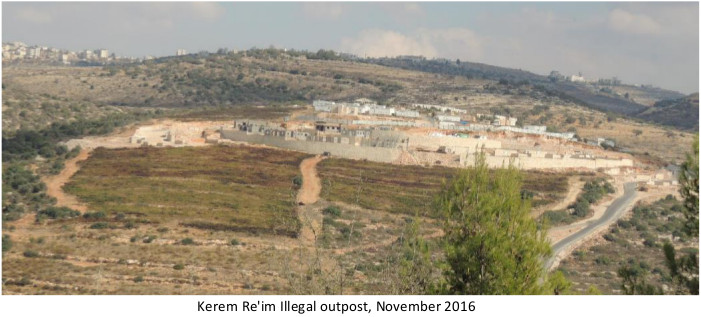Israel’s Peace Now movement submitted on March 5th 2017 a petition to the Israeli High Court of Justice against the newly adopted Expropriation Law (also known as the Legalization Law or the Regulation Law), a law that allows the expropriation of privately-owned West Banks Palestinian land for settlement construction.
Americans for Peace Now strongly condemns new Israeli legislation adopted today by the Knesset, which would ban entry to Israel of foreign nationals who support or publicly engage in boycotts of either Israel or West Bank settlements.
APN's President and CEO Debra DeLee said: "This new draconian law is a severe blow to Israeli democracy. It is aimed at a basic civil liberty, the freedom of expression, and will severely harm Israel by keeping out some of its greatest supporters.
--Brig. Gen. (res.) Dr. Meir Elran argues that the 'tunnel threat' is neither 'existential' or 'strategic' and is one that Israel can live with.*
--At an education conference, Israel’s President Reuven Rivlin accused Israel's government leaders of incitement between the different sectors of Israeli society - Jewish-Arab, Ashkenazi-Mizrachi, religious-secular - in order to gain political power. Rivlin spoke about the need for unity amongst the various sectors of Israeli society. He encouraged Jews and Arabs, religious and secular to meet and discover each other and find a common ground.*
I’ve been devoting much of my life to activism in support of Israel’s future wellbeing,
advocating for peace and security, working to bolster Israel as a democracy and a Jewish state, living side by
side in peace with a sovereign Palestinian state.
I was raised with the infant state of Israel in the late 1940s as the sixth child in the household of my parents Philip and Ethel Klutznick, activists and strong supporters of Israel’s right to exist and thrive as the homeland of the Jewish people. Dad, an international Jewish leader, advocated for the survival and the growth of Israel throughout his lifetime, but warned in the early 1980s that Israel must negotiate peace with its enemies, a common sense position of strength through peace.
Monday, Israel’s Knesset kicked me in the behind. It made me into a persona-non-grata.
--Joint List Leader Ayman Odeh said before he was removed from the raucous Knesset debate over the bill to silence the Muslim call to prayer loudspeakers. *
Since the mid-1990s, the settlers established nearly 100 illegal outposts and built dozens of neighborhoods and illegal projects in many settlements. In 2015 alone 15% of the units constructed in the settlements was illegal.

During the past year, Settlement Watch conducted extensive research on illegal construction in settlements and
outposts. The data collected exposes a process parallel to the official planning process in the settlements – that
of illegal construction. This parallel process is what allows for thousands of housing units to remain on the
ground, and be connected to roads and infrastructure.
If supporting a non-violent boycott of the settlements makes me an enemy of the Israeli state, so be it. But
Israel's border officers will have to hear my story before they turn me away for good.
Okay, yes, I’ve written critical articles and signed Open Letters protesting Israel’s occupation of the West Bank and decrying the settlement enterprise; and yes, I’ve been a member of Americans for Peace Now for more than 30 years and a supporter of B’Tselem, Human Rights Watch, ACRI, and the New Israel Fund, among other “suspect” organizations. So it’s a safe bet that, under the new Israeli entry ban, I’m going to end up on the government’s blacklist.
--Letty Cottin Pogrebin, a founder of Ms. Magazine and a past Chair of Americans for Peace Now, writes that she expects that under the new Israeli entry ban, she’ll end up on the government’s blacklist - but she won’t give up on Israel.
Since the mid-1990s, the settlers established nearly 100 illegal outposts and built dozens of neighborhoods and illegal projects in many settlements. In 2015 alone 15% of the units constructed in the settlements was illegal.
During the past year, Settlement Watch conducted extensive research on illegal construction in settlements and outposts. The data collected exposes a process parallel to the official planning process in the settlements – that of illegal construction. This parallel process is what allows for thousands of housing units to remain on the ground, and be connected to roads and infrastructure.
Peace Now's study reveals that three main bodies operate this parallel and illegal process: (1) Settlement Regional Councils, (2) Settlement Division and (3) Amana. The Israeli government enables the illegal system to exist by cooperating directly with these three bodies, by abstaining from law enforcement or prosecution, and by retroactively legalizing the illegal constructions.
Through this illegal mechanism, Israeli governments have allowed a small group of settlers to set Israel's settlement policy and thereby determine the future of Israel.
Key Findings:
- The ten stages of establishing illegal outposts: from paving roads and placing mobile homes to the administration and finance of the illegal outpost.
- Illegal construction permits issued by regional councils: These permits, referred to as “principle construction permits,” or “temporary construction permits” are meant to mislead a variety of different institutions, so that these are unable to tell that the construction is, in fact, illegal.
- Illegal construction funding through non-recurring expenses (NRE): NREs are on-time transfers from local authorities to specific projects and are usually nontransparent. Peace Now has managed to uncover that in the years 2000 – 2014, the Binyamin municipality authorized the transfers of over 116 Million NIS to illegal outposts and illegal projects.
- Amana's accumulation of capital with the help of the Settlement Division, and on the expense of the state and the settlers: The state grants the Settlement Division the authority to manage lands in the Occupied Territories. The Division then allocates lands to Amana for free. Amana builds, sometimes illegally, and sells homes to settlers in prices which embody the cost of the land. While the state does not receive any returns, Amana is making a fortune on the expense of the settlers.
- Illegal allocation of lands by the Settlement Division: Although the Settlement Division received enormous amounts of lands from the state throughout the West Bank, it allocates to settlers public lands that are not under its supervision. Not only that but the Settlement Division also allocates private lands owned by Palestinians (as in the example of the illegal outpost of Amona).
- The role of Amana as a settler lobby, a body that is “above the law,” despite many testimonies of illegal activity: Amana acts as the unofficial representative of the settlers, and raises private funding as well as public resources for the benefit of the settlements. Despite many testimonies regarding vast illegal activity, Amana manages, time after time, to avoid prosecution and punishment.
